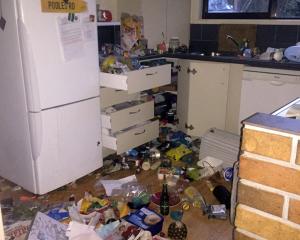The city's heritage heart of pre-1935 masonry buildings is in the worst position, but even owners of newer or earthquake-strengthened buildings are facing higher costs as international reinsurers retreat.
The changes have been triggered by the earthquakes that devastated Christchurch and cost reinsurers dearly, but have already prompted a warning from one Dunedin heritage building owner.
Ted Daniels told the Otago Daily Times the extra costs could have a "major" impact, forcing some Dunedin building owners to reduce their insurance cover, or forgo it altogether and simply "walk away" if a natural disaster struck.
Mr Daniels, who owns the 127-year-old former BNZ building in the Exchange and the 109-year-old Bracken Court in Moray Pl, told the ODT both were insured, but Bracken Court's cover would soon be up for renewal.
Advice from his insurance broker was the new policy would come with a 10% excess, but - for the first time - it would be based on the value of the building and not the value of a claim, as happened previously, he said.
That was despite the building undergoing a $3 million refurbishment, following a fire in 2005, and being earthquake-strengthened, he said.
The change meant a huge jump in the overall excess required before a claim would be covered, and that "really can stuff up a lot of people", he said.
"Your excess is so huge that you'll never be able to claim it... It could be a major problem, really."
The warning comes after the ODT revealed on Saturday the Dunedin City Council now had $2.4 billion in uninsured infrastructure assets as a consequence of the Christchurch earthquakes.
New Zealand Historic Places Trust Otago Southland area manager Owen Graham said the situation facing buildings in Dunedin was "a matter of concern".
That was because of the way owners might react and the potential impact on heritage buildings in the city, he said.
Insurance industry sources in Dunedin - who would not be named - said the change in excess calculations was being faced by all building owners across the city, and was not restricted to heritage buildings.
The move, triggered by the Christchurch earthquakes, had been introduced in Dunedin in the past six weeks, with building owners learning of it as policies came up for renewal.
The excess for natural disaster cover ranged from 2.5% to 10%, depending on the age of the building and the insurance company, but virtually all pre-1935 masonry buildings were at the 10% end of the range.
The new excess calculations were based on "site value", meaning a building's value for a landlord, or the value of a building and the plant and stock inside, where applicable.
The excess would be applied to material damage cover, but also - for the first time - to business interruption policies.
Earthquake-strengthened buildings were still facing extra costs because the safety work was designed to protect people, rather than keep buildings intact.
The cost of natural disaster cover - one part of total premium calculations - was also rising by between 20% and 300%, with older heritage buildings again bearing the brunt.
"If you've got an old building and it's not in the best condition, the chances are you're going to be closer to 300% than 20%," one source said.
A major post-quake driver was that New Zealand insurance companies were often seeking reinsurance from the same international reinsurers, who shared a new perception of risk in New Zealand.
Insurance Council of New Zealand spokesman Brett Solvander, of Wellington, said rising costs in Dunedin, as the risk assessment of older masonry buildings changed, was "certainly taking place".
The same trend was evident in other centres as insurance companies looked again at "deductibles", such as the way excess was calculated, to provide "sustainable" insurance, he said.




